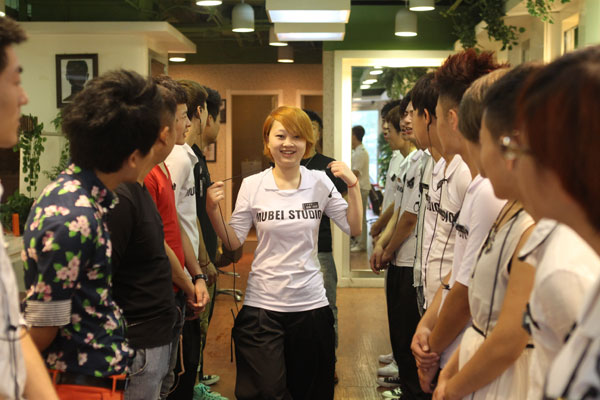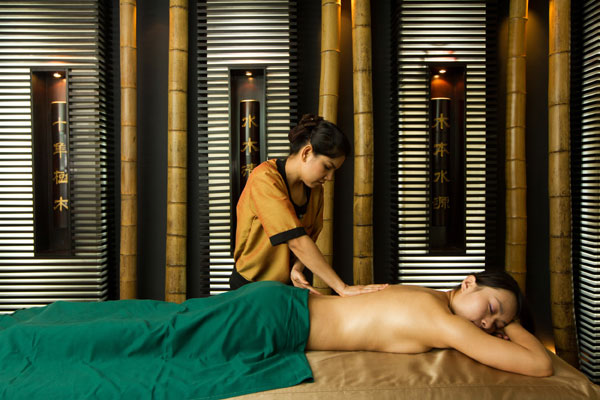China's beauty industry profits from a makeover
Updated: 2012-08-17 08:07
By Xie Yu (China Daily)
|
|||||||||||
After years in the doldrums, salons are losing their ugly reputation, reports Xie Yu in Shanghai.
Shanghai sizzles in the summer. In China's humid south, the temperature can easily climb to 38 C by lunchtime. For years, locals have rushed to overcrowded swimming pools and assembled in air-conditioned shopping malls in a vain attempt to avoid the sweltering streets.
 |
|
Beauty salons, featuring spas, body massage and facial treatments, have sprung up across China in recent years and business is booming. Feng Yongbin / China Daily |
 |
|
A woman enjoys a massage at Banyan Tree Spa, a luxurious health center in Shanghai. Gao Erqiang / China Daily |
But now, there's a new kid on the block for heat-harassed residents. An industry previously perceived as shady, unregulated and downright unseemly, has come in from the cold. China's beauty industry has had a makeover.
Candlelight, fragrant essential oils and soft Zen music are rapidly becoming the order of the day, helping to calm frazzled minds, while therapies tailored to individual need and based on the use of natural herbs and spices, provide succor for body and soul.
But the treatment doesn't come cheap, especially in a country where salaries are still relatively low. An hour at a spa costs 900 yuan ($141) on average, that's around one-fifth the monthly salary of a junior white-collar worker. Even promotional packages can set the customer back more than 600 yuan a visit.
The cost doesn't seem to have dampened enthusiasm, though: "We are absolutely packed all the time," said Carolyn Zhang, assistant vice-president of China Spa Business Development and Corporate of Banyan Tree Spa, a luxurious Shanghai health center.
"I often treat myself to this luxury," said Sherry Guo, 25, who works in the human resources department of an international home appliance company. Gao earns about 6,000 yuan per month and although that's not a huge amount, she spends freely on facials and body massages. She calls it a "reward" to herself.
"I usually search online to see if the high-end places have special offers. I would rather spend money on this than on food. After all, I don't gain weight by indulging in the therapy, and it's good for my health," she laughed.
Beauty salons featuring spas, massages and decompression treatments have sprung up across China in recent years, leaving industry insiders excited by the rapid expansion. The industry's market value has already surpassed 400 billion yuan per annum and will reach 600 billion in the next three to five years, with an annual growth rate of more than 15 percent, according to a report published in June by ChinaVenture Capital and Private Equity Association, a leading investment consultancy.
Unseemly image
The industry's recent success is a far cry from the situation 20 or even 10 years ago. "I never expected it would flourish in this way," said Zhou Yanli, a 30-year-old senior facial therapist at Palai Spa, which has 40 salons across China, including three in Shanghai.
After graduating from technical secondary school in 1998, Zhou tried many different jobs, but the thought of becoming a beauty therapist never crossed her mind. After years working in jobs as varied as hotel waitressing and sales, she read an advertisement for Yue-Sai beauty school in 2003. "Yue-Sai is a household big brand in China so I thought the school must be aboveboard," she said.
"Previously, the industry was nothing like it is today. The image was so bad that parents were worried their children would be exposed to loose morals if they worked in beauty salons," she explained.
Even in the late 1990s, most beauty salons were simply small booths hidden away in the backstreets. They mainly offered facial massages and simple plastic surgery procedures such as eyelid blepharoplasty (surgical modification of the eyelid and surrounding areas.)
Related Stories
China to tighten control of cosmetic surgeries 2012-08-14 10:27
Cosmetic surgery 2012-07-16 08:59
Quality watchdog returns food, cosmetics 2012-06-28 20:06
Not cosmetics, nor pharmaceuticals, but cosmeceuticals 2012-03-19 08:06
A tale of dictionaries and cosmetics 2012-04-19 08:13
Today's Top News
President Xi confident in recovery from quake
H7N9 update: 104 cases, 21 deaths
Telecom workers restore links
Coal mine blast kills 18 in Jilin
Intl scholarship puts China on the map
More bird flu patients discharged
Gold loses sheen, but still a safe bet
US 'turns blind eye to human rights'
Hot Topics
Lunar probe , China growth forecasts, Emission rules get tougher, China seen through 'colored lens', International board,
Editor's Picks

|

|

|

|

|

|





